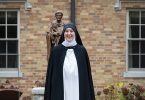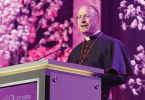or explore your spirituality with some Catholic All-Stars as your guide
by Kara Hansen
Sometimes, a joke can say it all. The Benedictines, Franciscans, Dominicans, and Jesuits were having a big meeting that went well into the middle of the night. Suddenly, all the lights went out in the meeting room.
The Benedictines immediately started chanting psalms glorifying God; the Franciscans took out their guitars and sang songs praising all creation; and the Dominicans began preaching about the meta- physics of light and darkness.
Meanwhile the Jesuits went to the basement, found the fuse box, and reset the breaker.
Though some of the nuance might be lost on the average Catholic, this simple joke speaks volumes about the different paths Catholics over the centuries have followed on their way to Christ.
In other words, ours is not a one- size-fits-all faith — there is a style of following Christ out there for everyone. Four of the most recognizable spiritual orders of the Catholic Church — Benedictines, Franciscans, Jesuits, and Dominicans — each has a distinctive way of living out the faith.
The end goal — loving God — is always the same. But each spirituality has a different way of getting there.
If you’ve never given serious thought to your “brand” of spirituality before, there’s no better time than at the beginning of a new year — and the church year starts with Advent.
Then, as a new year’s resolution, you might decide to dedicate some time to deepening your faith within that tradition.
But first, a whirlwind tour of four ancient spiritual traditions.
Benedictine
Founded by: St. Benedict, St. Scholastica
Motto: “That God may be glorified in all things.”
The Benedictines are the oldest order in the world, founded 1500 years ago by St. Benedict and St. Scholastica,” said Sister Anne Shepard, prioress of Mount St. Scholastica Monastery in Atchison. “We are a contemplative order, but not cloistered. We were founded to lead a common life, so our primary ministry is community.”
Part of the way that community is lived out among Benedictines is the practice of gathering for prayer. Four times a day, Benedictine monks and nuns pray the Divine Office, a collection of psalms and Scripture, together.
“Out of our prayer and community flows our ministry,” said Sister Anne. “We are known for responding to the needs of the day.”
While St. Benedict is known as the founder of monastic life as many know it in the Western world, Benedictine spirituality has much to offer laymen and women who have never set foot in a monastery.
“Because I grew up in a small town, I quickly identified with the Benedictine way of hospitality and integrating prayer and work,” said John Schmidt, a parishioner at Prince of Peace Parish in Olathe. “My parents, even still today, are very active volunteers in their parish. I view the Benedictine motto ‘ora et labora’ (‘prayer and work’) not only as pray while you work, but to offer up your work as a prayer.”
Schmidt was first exposed to Benedictine spirituality when his wife was a residence hall director at Benedictine College in Atchison.
“Working in retail, I try to be the model of hospitality,” said Schmidt. “It’s not easy to see Christ in everyone. It’s in the most difficult people that I have to remind myself that they still deserve to be treated with compassion.”
One would be hard-pressed to define exactly what kinds of ministry a Benedictine does. Indeed, it seems what type of ministry one does matters less than how one does it. Exercising hospitality and building community in any job or ministry are trademarks of Benedictines.
“Receiving all guests as Christ and, above all, serving Christ in the sick is what we are called to as Benedictines,” said Sister Anne.
Originally invited to the archdiocese in the 1800s to teach the children of German immigrants, the Benedictine Sisters are now involved in a wide range of ministries.
“We respond to the needs of the present time and where the church is calling us,” said Sister Anne. “Part of who we are is building community wherever we go. We have the mindset that God is alive in our personal life and in our community life.”
Schmidt would agree. He has found that the Benedictine influence has brought him closer to God in his daily life. “Another Benedictine teaching I hold dear is ‘That in all things, God may be glorified,’” said Schmidt. “It is our job as people of faith to see the good in all things. By offering up difficult situations, we can grow in faith by becoming more reliant upon God’s grace.”
Franciscan
Founded by: St. Francis of Assisi
Motto: “Peace and good”
Franciscans are known for their commitment to simplicity and to the poor, as well as their love of God’s creation. They can often be found in ministries dedicated to the underprivileged, advocating for pro- life and family issues, and working to protect God’s creation.
“St. Francis had a profound respect for every human person,” said Sister Doris Engeman, founder of the Franciscan Servants of the Holy Family in Shawnee. “I think that if St. Francis was alive today, he would help people understand their dignity as sons/ daughters of our heavenly Father, as persons created in God’s image. He would encourage respect for human life and all creation.”
Sister Doris was originally attracted to the Franciscan spirituality by the person and example of St. Francis. His deep love for God, his simplicity in life, and his strong desire for conversion were all appealing to her and ultimately influenced her decision to become a Franciscan religious.
“Franciscans witness through personal conversion, joyful humility and simplicity of life, fraternity (community), and respect for all God’s creation, born of an intimate relationship with God our Father, in joyful gratitude for his love,” said Sister Doris.
Diane and Linus Drouhard, parishioners of Curé of Ars in Leawood, were so attracted to Franciscan spirituality that they became Secular Franciscans. Secular Franciscans are men and women who strive to live the Franciscan lifestyle but are not priests or religious.
“Our calling is rather to live in the everyday world by bringing life to the Gospel through living the Gospel life,” said Diane. “This quote is attributed to St. Francis: ‘Go out into the world and preach the Gospel; use words if necessary.’ We try to maintain a detachment from the world, while realizing that all we have is a gift from God to be shared with one another.”
In living out the Franciscan lifestyle, the Drouhards have found that less is more.
“We try to live simply,” said Diane. “We do our jobs at work, respecting the requests of our employers and putting the needs of our co-workers above our own, while bringing the light of Christ into everyday situations. It’s a role of service to our families, our communities, our jobs, our country. Again, we are trying to preach the Gospel by our actions and deeds more so than words.”
Wherever they are and whatever they are doing, Franciscans are called to witness their faith to others through their actions. Therefore, they are committed to ongoing conversion.
“St. Francis heard Christ on the cross say to him, ‘Francis, go rebuild my church; as you see, it is falling into ruin.’ St. Francis did a lot in his lifetime by promoting personal holiness for religious and for laity,” said Sister Doris. “I think that Christ continues to call us, in the spirit of St. Francis, to rebuild the domestic church (the home), which is under attack, and in many cases, crumbling. Conversion to Christ in individuals and within families will help rebuild families and society.”
Jesuit
Founded by: St. Ignatius of Loyola
Motto: “For the greater glory of God”
Entire generations of American Catholics have, at some point in time, been taught by a Jesuit, and it would be a rare March Madness that didn’t feature at least one Jesuit college in post-season tournament play. But while Jesuits are well-known for their contributions to Catholic education in the United States, that really only tells part of the story of their work.
“St. Ignatius placed a great deal of emphasis on education as a way to God, what we now call the ‘intellectual apostolate,’” said Father James Martin, SJ, author and culture editor of America magazine. “But since the early Jesuits were intent on finding God everywhere, they did almost every type of ministry you could imagine for priests and Brothers — working with the poor, working with reformed prostitutes, working in parishes, and so on.”
Jesuits clearly place a strong emphasis on finding God in all things. The spirituality is one that is readily available to any layperson in any type of work or vocation.
“God is present to all of us not sim- ply in church or in the reading of sacred texts alone. God can be found everywhere — in relationships, work, play, nature, music and so on,” said Father Jim.
“At every moment of our day, God is inviting us to experience God. Also, most Jesuits would likely talk about being a ‘contemplative in action,’ a person in the midst of a busy life who nonetheless tries consciously to look for signs of God,” he added. “So you are a sort of ‘monk in the world.’ Essentially, it’s a desire for an awareness of God’s presence at all times.”
For those interested in a deeper experience of the Jesuit spirituality, Jim recommends “The Spiritual Exercises of St. Ignatius of Loyola.”
“It is a sort of four-week program for prayer that follows the life of Christ,” he said. “Basically, Ignatius asks us to imagine ourselves in the Gospel scenes, so as to draw closer to Christ. And in that prayer, as we imaginatively place ourselves with Jesus and the disciples, we pay attention to our emotions,
our desires, our thoughts, our memories — any sort of feeling or intellectual insight that arises.
“So ‘Ignatian spirituality’ places a great deal of emphasis on the way that God can work through our imagination, which is, after all, a gift from God.”
There is an emphasis on freedom and detachment in the Jesuit charism as well, which calls each person to let go of anything that might prevent him or her from drawing closer to God.
Jesuits also regularly use an examination of conscience, in which they take 15 minutes or so to mentally review their day and look for signs of God’s presence.
“Today, you can find Jesuits doing anything to advance ‘the greater glory of God,’ which is our unofficial motto,” said Father Jim. “So I have friends who are priests and Brothers, but at the same time astronomers, lawyers, prison chaplains, army chaplains, physicians, writers, peace activists and on and on. Finding God in all things means in all ministries, too.”
Dominican
Founded by: St. Dominic
Motto: “To praise, to bless and to preach.”
The Dominican spirituality is characterized by a love of God and a desire to share that love with all people, primarily through preaching. Though Dominicans take up many types of active ministry, including teaching, they are specifically called to minister through preaching.
“The charism of preaching drew me to the Dominicans,” said Kim Pitner- Keller, a parishioner at Holy Trinity in Lenexa. “The whole idea that we are called to preach in our everyday lives by being attentive to the Lord, proclaiming the word, and celebrating life is totally what brought me to the Dominicans.”
Though the word “preaching” conjures up images of an ordained minister delivering homilies in a church, Dominicans use the term more broadly than that. For the Dominican, preaching involves finding ways to help share the Gospel with people wherever they might be.
Dominicans are also well-known for their contributions to academic and scholarly endeavors. The Dominican charism places a strong emphasis on “seeking the truth” through study, prayer, and life experiences.
Study is considered a never-ending, lifelong task for the Dominican. “Living my life this way with the focus on the four Dominican pillars — that our preaching flows from prayer, study, community, and ministry — really helped me see that I am called to the Dominican spirituality,” said Pitner-Keller.
The Dominican style of spirituality so appealed to Pitner-Keller, in fact, that she ended up becoming an associate of the Dominicans of Peace, a newly merged Dominican order with a house in Great Bend.
Though scholarly study is a Dominican trademark, the active compassion of the Dominican order is what first attracted Pitner-Keller.
“Growing up, my mom had a mental illness and, at one point, was in the hospital for treatment,” she said. “I was at home and came downstairs to see a woman doing laundry in our house, a Dominican Sister. I asked her what she was doing and she said she had heard my mom was in the hospital and so she had come over to help out.
“It was the first time I saw a nun as a real person. She was living out the Dominican way of ‘being attentive to the Lord’ by doing what needed to be done — laundry, in a family with six kids.”
Dominicans would likely refer to the Sister’s actions as contemplative action. Dominican spirituality emphasizes taking time to contemplate the word of God and then acting on it. “Study is important in the Dominican tradition, but if you don’t experience community along with it, it’s almost a moot point,” said Pitner-Keller.






